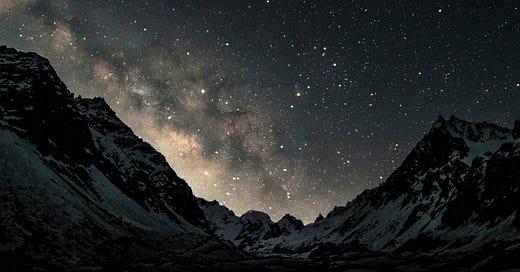Letting out an audible sigh, I sank into my seat at the table, unwrapping my scarf and peeling off my coat.
“Aporia!” I exhaled.
My friends laughed in agreement.
We knew the feeling well—confronted with just how much we didn’t know, our minds swirled with new ideas, struggling to piece it all together. We raised a toast to Plato’s Meno, said a prayer for the learning ahead, and feasted on a Mediterranean spread at a charming little restaurant in downtown Portland. With full bellies and happy hearts, we trekked back to our hotel, ready to do it all again the next day.
What is Aporia?
In Greek, aporia means difficulty or perplexity—literally a- (without) and poros (passage). It’s that moment when you’re confronted with just how much you don’t know, leaving you uncertain and confused.
Our professor explained that aporia is necessary: only when we acknowledge what we don’t know can we begin the journey toward true understanding. It’s frustrating, painstaking, and even disorienting—but its rewards are rich.
Learning as a Journey Through Aporia
Graduate school taught me to embrace aporia. With each new text, professor, and lecture, my cohort and I braced ourselves for the plunge, trusting we would emerge—eventually—on the other side with deeper understanding (and, Lord willing, a bit more wisdom).
In addition to this little podcasting hobby, I’ve taken up the task of teaching science to 7th graders this year. Exploring the wonders of God’s created universe alongside my students has been an absolute delight, after all, education is a life-long journey, is it not?
This past week, we began a semester-long study of astronomy. To say I hurled myself into a state of aporia would be an understatement. After all, what could be more humbling than trying to comprehend the cosmos? And yet, the best place to start is always with the confession of how much we don’t know.
I hope I’ve sparked a bit of curiosity about the cosmos in the scripture, stories, and music I’ve shared on the podcast this season. Perhaps your family is ready to engage in some astronomical aporia. If so, read on!
Resources for the Wondering Mind
In my planning, I’ve come across some helpful and beautiful resources that I wanted to share. If you, too, recognize how much you don’t know but want to know more, this list is for you. So brew a strong cup of coffee and get ready for blast off!
📚 Story of Science: From the Writings of Aristotle to the Big Bang Theory – Susan Wise Bauer
A compelling journey through the history of scientific thought, this book weaves together the writings of great thinkers like Aristotle, Copernicus, Galileo, and Einstein. It’s perfect for those who want to see how ideas about the universe have evolved over time.
📚 The Astronomy Book: Big Ideas Simply Explained – DK
This beautifully designed book makes complex astronomical concepts accessible, breaking down everything from black holes to the history of space exploration in an easy-to-understand way. Great for visual learners!
📚 Planetarium: Welcome to the Museum – Raman Prinja & Chris Wormell
A visually stunning “museum in a book,” featuring breathtaking illustrations of celestial bodies and fascinating facts about the universe. A wonderful resource for both kids and adults who love space.
📺 The History of the Telescope – History Channel
A fascinating documentary that explores how the invention of the telescope transformed our understanding of the cosmos, featuring insights into Galileo’s discoveries and modern space telescopes.
▶️ Illustra Media – YouTube clips
Illustra Media produces high-quality, thought-provoking films on science and intelligent design. Their astronomy-focused clips explore the complexity and beauty of the universe, sparking deep discussion about the origins of our world.
🌌 Star Walk 2 – Interactive stargazing app
A fantastic app that lets you explore the night sky in real time, identifying constellations, planets, and deep-space objects just by pointing your phone at the sky.
🎨 Constellation Coloring Book
A fun and interactive way to engage with the stars—perfect for 8-14 year old learners who want a hands-on approach to discovering constellations.
📖 Constellations for Kids: An Easy Guide to Discovering the Stars
A beautifully illustrated encyclopedia introducing young learners to the wonders of the night sky, making astronomy accessible for kids.
✨ What We See in the Stars: An Illustrated Tour of the Night Sky – Kelsey Oseid
A blend of science, mythology, and art, this book explores the constellations and celestial phenomena through stunning illustrations and storytelling.
✨ The Privileged Planet
A thought-provoking exploration of Earth’s place in the universe, this documentary examines whether our planet is the product of grand design or mere cosmic coincidence. My students and I have been contemplating this very question: Is Earth uniquely positioned for life with purpose, or is it insignificant and purposeless? The Earthrise and Pale Blue Dot images have sparked deep discussion—so much to ponder!
Until next time, don’t forget to look for the Good Way!
Holly
P.S. If you purchase the books through the links above, I’ll get a small kickback. Thanks for supporting this work!






Hey Holly! I just started listening to your podcast -- Season 11, Episode 1. My oldest is 3.5. So, I don't think he caught much of the episode. BUT, he did attach to "The Planets, Mars" song at the end of that first episode. Something about it just sparked his imagination and he's been playing "roman soldier" along with the song for days. I even added it to a Yoto card and he listened for a couple of hours today!
Your podcast is so wonderful for exposing kids young and old to the good, the true, and the beautiful through literature, history, and music. I can't wait to see what else sparks his imagination and leads to more learning!
My husband and I both read The Story of Science last year for the first time. What a fabulous read and an amazing way to understand "scientia" as knowledge first.